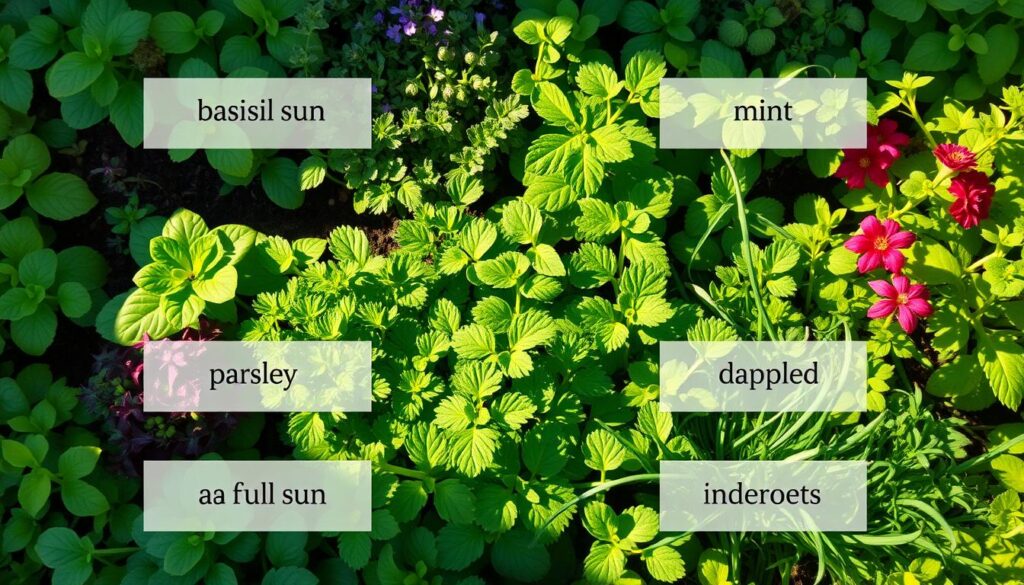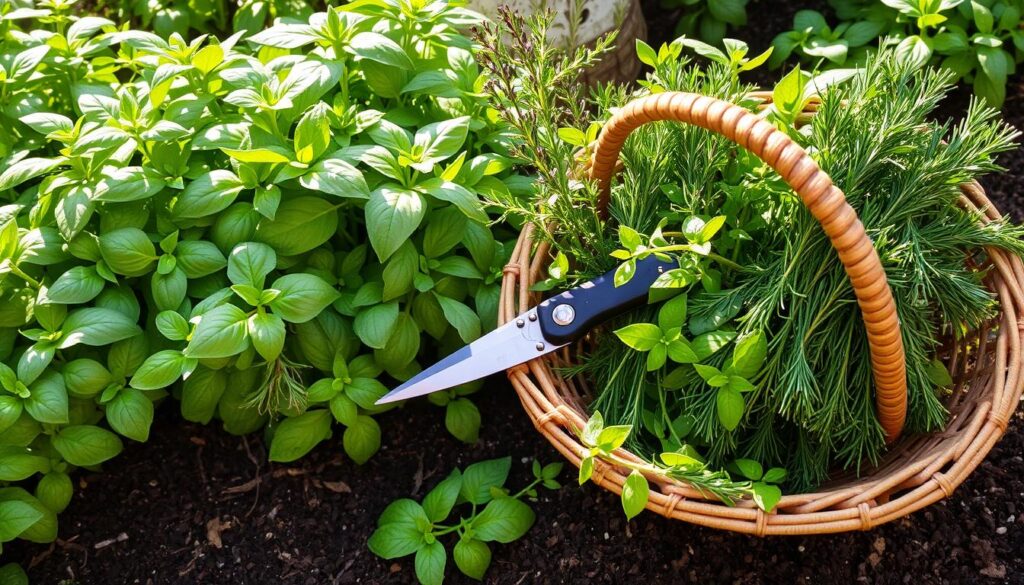Ever wondered why some herb gardens do well while others don’t? The answer often lies in good planning. Knowing how to design your garden and pick the right plants is key. Whether you’re new to gardening or have experience, planning well is crucial for a lush herb garden.
Let’s dive into the main strategies for a thriving garden. We’ll also look at common mistakes to avoid.
Key Takeaways
- Effective herb garden planning sets the stage for a successful garden.
- Choosing the right garden layout design maximizes space and plant health.
- Understanding the benefits of growing herbs can inspire your gardening journey.
- Strategic planning minimizes common mistakes and maximizes yields.
- Cultivating herbs at home provides fresh flavors and medicinal benefits.
- Awareness of your environment is crucial for thriving herb cultivation.
Understanding the Basics of Herb Gardening
Herb gardening is a fun and rewarding hobby. It brings fresh ingredients to your meals and saves money. Plus, herbs add beauty and fragrance to your garden. Learning about growing herbs is key to starting your garden.
Benefits of Growing Herbs at Home
Growing herbs at home has many benefits. They ensure your food tastes better and are always fresh. You can also save money by not buying them.
Enjoying the flavors and growing organic herbs is a joy. The look and smell of herbs make your outdoor space welcoming.
Choosing the Right Location for Your Herbs
Choosing the right spot for your herbs is important. Look for areas with lots of sunlight. Most herbs love full sun.
Wind can affect your herbs, so pick a sheltered spot. Being close to water makes caring for your herbs easier. Planning well will help your herbs grow well.
Selecting the Best Herbs for Your Garden
Choosing the right herbs for your garden is key to a thriving space. A well-chosen selection adds beauty and brings culinary and medicinal benefits. This guide helps you pick the best herbs for your garden.
Popular Culinary Herbs to Consider
Think about the flavor and versatility of popular herbs. Here are some:
- Basil: A must in Italian cooking, basil loves warm, sunny spots.
- Rosemary: Great for roasting meats and veggies, it’s hardy.
- Thyme: Its earthy taste goes well with many dishes.
Harvesting herbs regularly makes them bushy and flavorful. They’re essential for any herb garden.
Medicinal Herbs for Your Home Garden
Adding medicinal herbs boosts your garden’s benefits. Plant these:
- Peppermint: Good for digestion and headaches.
- Echinacea: Boosts immunity during cold and flu season.
- Lavender: Known for calming, great for sleep.
These herbs are not just useful but also add variety to your garden.
Seasonal Herbs: What to Plant and When
Knowing when to plant seasonal herbs ensures a year-round supply. Here’s a planting guide:
| Herb | Planting Season | Harvest Time |
|---|---|---|
| Basil | Spring | Summer |
| Chives | Early Spring | Late Spring through Summer |
| Oregano | Spring | Summer through Fall |
Planting herbs at the right time ensures they grow well. A well-planned garden offers fresh ingredients and remedies all year.
Designing Your Herb Garden Layout
Creating a good garden layout is key for any herb garden. You can choose between raised beds or in-ground planting. Each has its own benefits for soil, pests, and upkeep.
Raised Beds vs. In-Ground Planting
Raised beds help with drainage and make weeding easier. They also warm up faster in spring. On the other hand, in-ground planting offers a natural setting and works well for big gardens.
| Feature | Raised Beds | In-Ground Planting |
|---|---|---|
| Drainage | Excellent drainage | Depends on soil quality |
| Accessibility | Easy to access | Requires bending |
| Soil Control | Controlled soil mix | Native soil |
| Heat Retention | Warms faster | Varies with weather |
Companion Planting: Beneficial Pairings
Companion planting boosts your herb garden’s yield. Some herbs repel pests or attract good bugs. For example, basil near tomatoes improves their taste and keeps pests away.
- Basil and tomatoes
- Chives and carrots
- Rosemary and cabbage
Vertical Gardening Options for Small Spaces
Vertical gardening is great for small spaces. It lets you grow herbs up, using trellises or wall planters. You can hang planters for herbs like parsley or mint.
Soil Preparation and Requirements
The right soil is key for herbs to grow well and taste great. Good soil is full of nutrients that herbs need to thrive. To start your herb garden right, you need to know about soil and how to fix it if it’s not perfect.
Importance of Quality Soil for Herbs
Quality soil is the foundation of a great herb garden. It gives herbs the nutrients they need and helps their roots grow strong. Herbs do best in soil that drains well but still holds some moisture. The best soil is rich in organic matter, which keeps nutrients and water in.
Good soil has many benefits. It makes nutrients available, drains well, fights off diseases, and holds onto moisture. These are all important for healthy herbs.
Testing and Amending Your Soil
Testing your soil is a must to make sure it has the right mix of nutrients for herbs. You can buy soil testing kits or send a sample to a lab. This tells you what your soil needs.
After testing, you can add things to make your soil better. Some common additions are:
- Compost: Adds nutrients and makes soil better to work with.
- Peat Moss: Helps keep soil moist and lets air in.
- Organic fertilizers: Give herbs the nutrients they need to grow.
- Sand: Helps heavy soils drain better.
By testing and amending your soil often, you create a perfect spot for your herbs to grow. Good soil is a smart investment in your herb garden’s health.
| Soil Amendment | Benefits | Best For |
|---|---|---|
| Compost | Rich in nutrients, improves soil structure | All herbs |
| Peat Moss | Increases moisture retention | Drying soils |
| Organic Fertilizers | Provides slow-release nutrients | Feeding during growing season |
| Sand | Enhances drainage | Clayey soils |
Optimal Watering Practices for Herbs
Watering herbs right is key to their health. The amount of water needed depends on the herb type, climate, and soil. Finding the perfect balance is crucial to prevent wilting or too much water.
How Much Water Do Herbs Need?
Most herbs need about 1 inch of water a week. But, this can change based on:
- Soil Type: Sandy soils need more water than clay soils, which hold moisture better.
- Climate: Dry, hot climates need more water to keep herbs moist.
- Growth Stage: Young plants need more water as they grow roots.
Checking the soil moisture helps figure out how much water is best. This ensures your herbs grow well.
Drip Irrigation vs. Hand Watering
Choosing drip irrigation or hand watering affects your herb garden’s health. Each method has its own benefits:
| Method | Pros | Cons |
|---|---|---|
| Drip Irrigation | – Saves water – Reduces weeds – Can be automated |
– Costs to set up – Needs upkeep |
| Hand Watering | – Gives direct control – Better for small gardens |
– Takes time – Can lead to overwatering |
Drip irrigation is great for big gardens, while hand watering is better for small ones. Knowing your garden’s needs helps choose the right method.
Sunlight Needs for Different Herbs
Knowing how much sunlight herbs need is key to a healthy garden. Some herbs love full sun, while others prefer partial shade. Placing them right can boost their growth and taste.
Full Sun vs. Partial Shade Plants
Full sun plants need at least six hours of direct sunlight daily. They grow stronger and taste better in the right light. Partial shade herbs, however, do well with three to six hours of sunlight. They need some protection from the hottest sun to stay healthy.
Herb-Specific Light Requirements
Knowing the light needs of different herbs helps in planning your garden. Here’s a table showing common herbs and their sunlight needs.
| Herb | Sunlight Needs |
|---|---|
| Basil | Full sun |
| Mint | Partial shade |
| Rosemary | Full sun |
| Parsley | Partial shade |
| Thyme | Full sun |
| Cilantro | Partial shade |
By grouping herbs by their sunlight needs, gardeners can create a vibrant herb garden. This garden will be full of flavor and scent.

Pest Control and Maintenance Strategies
Keeping your herb garden healthy means using good pest control. Natural methods can protect your herbs without harming the environment. Knowing when to use organic pesticides helps keep your plants safe and green.
Natural Pest Control Methods
For a thriving herb garden, natural pest control is key. Here are some effective ways:
- Beneficial Insects: Ladybugs and lacewings eat common pests.
- Homemade Remedies: Garlic, neem oil, or soap can keep pests away.
- Companion Planting: Basil can keep aphids off your herbs.
When to Use Organic Pesticides
Even with natural methods, sometimes organic pesticides are needed. Follow these tips:
- Check for pest damage often to see if it’s too much.
- Use organic pesticides made for your herb pests.
- Apply pesticides in the late evening or early morning to protect beneficial insects.
| Pest Type | Natural Control Method | Recommended Organic Pesticide |
|---|---|---|
| Aphids | Introduce ladybugs | Insecticidal soap |
| Spider Mites | Use neem oil spray | Pyrethrin |
| Whiteflies | Encourage predatory wasps | Organic insecticide |
Using these pest control strategies can make your herb garden strong and healthy. Mix natural methods with organic pesticides for a great growing space for your herbs.
Harvesting Your Herbs Effectively
Harvesting herbs at the right time is key to getting the best flavor and freshness. Knowing when to pick different herbs is important. This helps bring out their taste and strength. Here, we share tips on how to harvest and store herbs to keep them tasty for your cooking.
Best Times to Harvest Different Herbs
The timing for harvesting herbs depends on the type. It’s best to pick them just before they bloom for the best flavor. Early morning is usually the best time because the oils are most concentrated then. Here’s a helpful guide:
| Herb | Best Time to Harvest | Notes |
|---|---|---|
| Basil | Late morning | Before flowers open for maximum flavor |
| Mint | Mid-morning | After dew has dried for optimal oil concentration |
| Rosemary | Around noon | When leaves are dry, and flavors are potent |
| Thyme | Late afternoon | Best flavor just before flowering |
| Cilantro | Early morning | Before it bolts for a fresher taste |
Techniques for Harvesting and Storing
When harvesting herbs, it’s better to cut them rather than pull them out. Use sharp scissors or garden shears to cut stems. This encourages them to grow back. For storing herbs:
- Drying: Hang bunches upside down in a cool, dry place.
- Freezing: Chop herbs and mix with olive oil, then freeze in ice cube trays.
- Oils and Infusions: Combine fresh herbs with oil for flavor-rich infusions.

Preserving Your Harvest
After growing your own herbs, preserving them is key. You can dry, freeze, or make oil infusions. Each method keeps your herbs fresh-tasting all year.
Drying Herbs: Tips and Techniques
Drying herbs is a classic way to keep them. It makes the flavors stronger and keeps them fresh longer. There are a few ways to dry herbs:
- Air Drying: Tie fresh herbs together and hang them upside down in a warm, dry spot.
- Using a Dehydrator: This method dries herbs faster. Just set the dehydrator low and let the herbs dry until crispy.
- Oven Drying: Place herbs on a baking sheet and dry them in a low oven. Check often to avoid burning.
Freezing and Oil Infusion Methods
Freezing herbs keeps their taste and color bright. Here’s how to freeze herbs:
- First, wash and dry the herbs well.
- Then, chop them and fill ice cube trays with them, covering with water or broth.
- Freeze until solid, then move the cubes to airtight bags for storage.
Oil infusion is another great way to preserve herbs. It makes their flavors even better:
- Combine fresh herbs with good olive oil. Let it sit at room temperature for a week, shaking daily.
- Strain the mixture and store the infused oil in small bottles.
Seasonal Care for Your Herb Garden
Keeping your herb garden healthy all year round is key. It’s important to care for your herbs in every season. This includes winterizing your garden and using special care for each season.
Winterizing Your Herb Garden
When it gets cold, it’s time to get your garden ready. Here’s how to winterize your herb garden:
- Cut back perennials to encourage new growth in the spring.
- Cover delicate herbs with a protective layer of mulch or fall leaves.
- Consider bringing potted herbs indoors to shield them from frost.
- Water the garden thoroughly before the ground freezes to help protect the roots.
Caring for Herbs in Different Seasons
Herb care changes with the seasons. Here are some important tips:
| Season | Care Technique | Specific Tips |
|---|---|---|
| Spring | Planting and Fertilizing | Use organic fertilizers to boost growth. |
| Summer | Watering and Harvesting | Water consistently and harvest regularly for best flavor. |
| Fall | Pruning and Preparing | Prune back plants and prepare for winter. |
| Winter | Protection and Monitoring | Monitor indoor herbs for light and water needs. |
Common Mistakes to Avoid with Herb Gardening
Starting a home herb garden can be rewarding, but many novice gardeners make common mistakes. These mistakes can harm your garden. Two big issues are overwatering herbs and planting them too close together.
Overwatering and Its Consequences
Overwatering is a big mistake that can cause root rot and other problems. Herbs do best in well-drained soil. Make sure your soil drains well.
Signs of overwatering include yellow leaves and wilting plants. New gardeners might think their herbs need more water. But, water your herbs only when the top inch of soil feels dry.
Planting Herbs Too Close Together
Planting herbs too close together is another mistake. It leads to competition for sunlight, water, and nutrients. This can slow down growth and lower yields.
Find out the best spacing for each herb. Give them enough room to grow well. Proper spacing helps your herbs stay healthy and makes caring for them easier.
FAQ
What are the best herbs to grow in an indoor herb garden?
Great choices for indoor gardens include basil, parsley, mint, and chives. These herbs do well in small spaces and love sunny windowsills.
How can I effectively plan my herb garden layout?
Think about how each herb grows when planning your garden. Use raised beds for better water flow. Also, plan how herbs will work together to save space and help each other grow.
What is the ideal planting schedule for seasonal herbs?
Planting times vary by herb. Cool-season herbs like cilantro and parsley do best in early spring or fall. Warm-season herbs, like basil, should go in after the last frost in spring.
How can I prevent overwatering my herbs?
Make sure your pots have holes for water to drain. Check the soil before watering. Herbs like to dry out a bit between waterings.
What soil is best for growing herbs at home?
Herbs love well-draining, nutrient-rich soil. A mix of potting soil and compost is perfect. It gives herbs the nutrients they need and ensures water drains well.
How do I protect my herb garden from pests?
Use natural pest control like ladybugs or homemade sprays. Also, rotate your crops and keep good air flow to fight pests.
What are some creative herb garden ideas for small spaces?
For small areas, try vertical gardening with wall planters or hanging pots. Window boxes are also great. These ideas let you grow many herbs without using much space.
When is the best time to harvest my herbs?
Harvest herbs in the morning for the best flavor. Make sure to leave enough leaves for the plant to keep growing.
Can I grow herbs in containers outdoors?
Yes! Many herbs do well in outdoor containers. Just make sure they have good drainage and get the right sunlight.
What are some effective methods for preserving my harvested herbs?
You can air-dry, freeze, or make infused oils to preserve herbs. Each method keeps herbs fresh and flavorful for later use.


